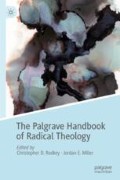Abstract
Leslie Dewart—born in Cuba, refugee to Spain, and later Canadian citizen and war veteran—wrote important and controversial philosophical challenges to Roman Catholicism in the 1960s. Later in life Dewart abandoned Catholicism and practiced law, but continued his philosophical project exploring human consciousness. Largely unknown and forgotten among Protestants, and suppressed among Catholics, Dewart is introduced to the reader in this chapter.
Access this chapter
Tax calculation will be finalised at checkout
Purchases are for personal use only
Notes
- 1.
Regarding “non-question,” we mean “Does God exist?”, “Is there a reality beyond our reality?”, and so on.
- 2.
Gregory Baum, ed., The Future of Belief Debate (New York: Herder and Herder), 1967.
- 3.
For Dewart , St. Thomas’ thought is intelligible only from the perspective of it being within the history of Western philosophical speculation. Leslie Dewart was definitively a historically aware philosopher. In his last posthumous publication titled Hume’s Challenge and the Renewal of Philosophy (2016), he chastises modern philosophy precisely for having been quintessentially a-historical in failing to recognize the historical antecedents of its own malaise.
- 4.
Hume’s Challenge is in many respects a rewording and specific application of the concepts that Dewart brought forward first and more generally in Evolution and Consciousness.
- 5.
For example, the existentialism of Sartre and trends in scientific atheism.
- 6.
Sumerian is an outlier non-Indo-European language that also conceives an ultimate reality. From this point on in the text, we will refer to these languages collectively as “Indo-European.”
- 7.
All conscious experience is self-present, but Dewart suggests that one form more adequately, though not necessarily explicitly, reflects self-presence.
- 8.
More precisely, we are apparently the only conscious species. Dewart does not completely rule out that other animals could be experiencing consciously but that he was critical of the evidence.
- 9.
It is literally impossible to be conscious of an unconscious experience, for once an experience is conscious, it is by definition not unconscious.
- 10.
This overstates the case for emphasis. Our human physiology underpins our ability to experience consciously, and animals by inference appear not to have the ability to make use of their physiology the way that we can use ours. But the crucial point, of course, is that the human use of physiology must be learned.
- 11.
Thus Dewart’s reversal of commonly accepted relation between speech and thought reflecting the primacy of speech over thought. Or, rather more accurately, Dewart proposes that there is a functional equivalence between speech and thought in Hume’s Challenge (2016), loc. 8392.
- 12.
By teaching a child to speak, the child is able to learn how to communicate assertively.
- 13.
To say we start as “nothing” is perhaps putting it too strongly. The self begins as a kind of negation: that which is other than (not) the object of experience.
- 14.
For example, consider Christianity’s concept of the “word,” the Greek concept of logos, the Hindu and Buddhist OM meditation, Judaism’s Decalogue, or the scientific laws of nature that govern the Universe for that matter. The list is, if not endless, certainly extensive and pervasive.
- 15.
Toronto Daily Star (3. Dec. 1966), as quoted in William Portier, “The Genealogy of ‘Heresy,’” American Catholic Studies 113.1/2 (2002), 77.
- 16.
Jaroslav Pelikan, “The Past of Belief,” in Baum (1967), 352–356.
- 17.
Portier, 67.
- 18.
Baum (1967).
- 19.
See Portier (2002), 65–77.
- 20.
Allan Savage, Dehellenization and Dr. Dewart Revisited (CreateSpace, 2013).
Works Cited
Baum, Gregory, ed. 1967. The Future of Belief Debate. New York: Herder & Herder.
Dewart, Leslie. 1963. Christianity and Revolution. New York: Herder & Herder.
———. 1966. The Future of Belief. New York: Herder & Herder.
———. 1969. The Foundations of Belief. New York: Herder & Herder.
———. 1970. Religion, Language and Truth. New York: Herder & Herder.
———. 1989. Evolution and Consciousness. Toronto: University of Toronto Press.
———. 2016. Hume’s Challenge and the Renewal of Modern Philosophy. Ed. C. Menke. Pennsauken, NJ: BookBaby.
Portier, William L. 2002. The Genealogy of ‘Heresy’: Leslie Dewart as Icon of the Catholic 1960s. American Catholic Studies 113 (1/2): 65–77.
Author information
Authors and Affiliations
Editor information
Editors and Affiliations
Rights and permissions
Copyright information
© 2018 The Author(s)
About this chapter
Cite this chapter
Sawa, R., Tarver, W.T.S. (2018). Leslie Dewart. In: Rodkey, C., Miller, J. (eds) The Palgrave Handbook of Radical Theology. Radical Theologies and Philosophies. Palgrave Macmillan, Cham. https://doi.org/10.1007/978-3-319-96595-6_11
Download citation
DOI: https://doi.org/10.1007/978-3-319-96595-6_11
Published:
Publisher Name: Palgrave Macmillan, Cham
Print ISBN: 978-3-319-96594-9
Online ISBN: 978-3-319-96595-6
eBook Packages: Religion and PhilosophyPhilosophy and Religion (R0)

